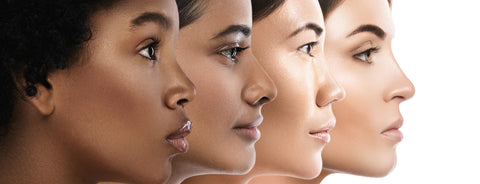
Your skin type is determined by a combination of factors, including your genetics, hormones, lifestyle habits, and environmental conditions. These factors can affect the oil production of your skin's sebaceous glands, its texture and thickness, as well as its sensitivity to irritants and pollutants. Knowing which type of skin you have will help you choose the best skincare products and treatments that are right for you. Additionally, it can help alert you to any potential health risks related to your skin type.
There are generally five types of skin: Normal, Dry, Oily, Combination, and Sensitive.
Normal Skin Type
- The most common type and can be recognized by its well-balanced moisture level, smooth texture, and even complexion.
- It has few blemishes or pores and is neither too oily nor too dry.
Dry Skin Type
- It lacks moisture and feels tight, causing it to become itchy, especially when exposed to wind or cold temperatures.
- The skin may even crack, flake off in patches, or appear scaly with a dull gray or ashy tone.
Oily Skin Type
- It’s easily recognizable as it appears shiny due to excess sebum production caused by overactive sebaceous glands.
- It can be prone to blemishes, pimples and blackheads due to bacteria buildup within the pores.
Combination Skin Type
- It consists of an oily T-zone (nose, forehead and chin) balanced by normal/dry cheeks and other areas of the face.
- This skin type can vary during different seasons of the year, and due to various factors, such as stress or hormone fluctuation.
Sensitive Skin Type
- Is more fragile than other types of skin and can react negatively towards certain ingredients found in skincare products.
- If you have sensitive skin, it may appear red and feel like it's burning, itching, or dry.
How to identify skin type?
Identifying your skin type is an important first step in creating a natural beauty routine. Knowing your skin type will help you determine which natural products are best for you and how to use them properly.
One of the simplest methods for figuring out your skin type at home is the “blotting paper test”. To do this, simply press a square of blotting paper against different areas of your face, such as your cheeks, nose and forehead. If the paper sticks to your skin and leaves behind an oily residue when you remove it, then you likely have oily skin. If there is no residue on the paper after removing it from your face, chances are that you have dry skin. Combination skin occurs when some areas of the face are oilier than others – if this is the case for you, simply look closely at each area to identify which one is more oily or dry.
Another way to distinguish whether you have normal, dry or combination skin is by taking a close look at yourself in natural light - preferably outdoors in natural sunlight. Normal skin should appear healthy with pores that can’t be seen – while those with oily or combination types may have visible pores due to overactive sebaceous glands. Dry skin will appear duller than other types and may also feel tight after washing; particularly around the cheekbones and mouth area.
Thankfully, many of Harper’s Naturals products work with all skin types. Some products that are great for a healthy skincare routine are African Black Soap, Shea Healing Butter, Carrot Seed Facial Hydrator, Hand and Foot Cream, and our Body Scrubs.
Enjoy 15% off this month only. No Code Needed.
